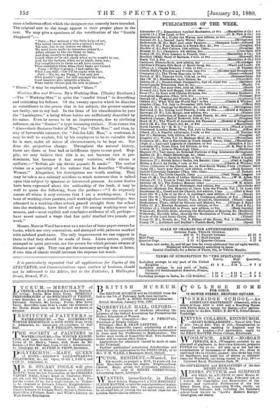Work-Men and Women. By a Working-Man. (Tinsley Brothers.) --The "
Working-Man " is quite the "candid friend" in describing and criticising his fellows. Of the twenty species which he discerns as subordinate to the genus that is his subject, the greater number are faulty, not to say bad. In the front of his classification he puts the " Lushington," a being whose habits are sufficiently described by his name. Even he seems to be an improvement, due to civilising influence, on the "Soaker," a type becoming extinct. Next comes the "Above-their-Business Order of Man," the "Club Man," and then, by way of favourable contrast, the "Job-for-Life Man," a workman, it may be well to explain, felt by his employers to be so valuable that be is sure, under all stress of circumstances, to be kept on. Nor does the proportion change. Throughout the natural history, there are three or four bad or indifferent types to one good. Hap- pily, we may believe that this is so, not because vice is pre- dominant, but because it has many varieties, while virtue is uniform,—" Ecreitas /Ale 'yap itirAas avpuuds 6 IMICC725." The author claims as a speciality of his volume that he describes " Working. Women." Altogether, his descriptions are worth reading. They may be taken as a salutary antidote to much nonsense that is talked upon this subject by ignorant or interested persons. As some doubts have been expressed about the authorship of the book, it may be well to quote the following, from the preface :—" I do expressly assure all whom it may concern that I am a working-man. I was born of working-class parents, amid working-class surroundings ; was educated in a working-class school, passed straight from the school into the workshop, have lived all my life among working-men and women, and—most explicit and conclusive evidence of all, perhaps— have never earned a wage that has quite' reached two pounds per week."
Messrs. Marcus Ward have sent us a number of loose paper-covers for books, which are very convenient, and stamped with patterns marked with subdued good-taste. The only improvement we can suggest in them is that they should be made of linen. Linen covers, prettily stamped in quiet patterns, are the clovers for which private owners of libraries now sigh. They can get the necessary sewing done at home, if two bits of elastic would increase the expense too much.


































 Previous page
Previous page